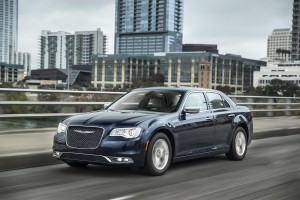
FCA denied reports its pulling the Chrysler brand from the Japanese market. It currently sells only the 300 there.
Fiat Chrysler is denying reports it plans to pull its just-barely-selling Chrysler brand from the Japanese market. The maker sold less than 300 vehicles in Japan in 2016.
“Although FCA Japan has already announced its intention to concentrate its resources on the Jeep brand ahead, no decisions have been made regarding (the) Chrysler brand,” the automaker said in a statement on Monday.
The Nikkei business daily reported FCA was ready to shut down sales of the brand based on the steady decline of sales since 2000. The brand’s never sold in close to the five-figure range in the last 17 years, and currently offers only the 300, which is sold through its Jeep dealerships.
While Chrysler sales are almost nonexistent, FCA’s Fiat and Jeep brands are doing well. In 2016, they sold around 6,700 and 9,400 units, respectively, putting them in the top 10 of foreign vehicle brands in Japan.
(Slowing auto industry threatening to drag down U.S. economy. Click Here for the story.)
Japan doesn’t have an open market, thus foreign cars make up a small percentage of the new vehicle sales there. According to Reuters, about 295,000 foreign branded new cars were sold in Japan last year accounting for just 10% total new vehicle sales, unless you account for Japan’s minicars, which U.S. makers do not build, then the number drops to a little more than 6%.
By comparison, foreign automakers account for more than half of all new vehicle sales in the U.S. In Japan, European marques account for 80% of the vehicles imported into the country, according to Forbes.
Although publicly denying it plans to leave the Japanese market, it would continue a trend of automakers pulling out of the highly protectionist arena. Last year, Ford announced it was pulling out of Japan. It sold just 5,000 vehicles in the country in 2015.
“Japan is the most closed, developed auto economy in the world, with all imported brands accounting for less than 6% of Japan’s annual new car market,” spokesman Neal McCarthy said last year.
While more than 10 times what Chrysler sold, Ford not only saw a protectionist system, it didn’t see any prospects that sales may increase substantially in the near- or long-term. Officials said Japan’s auto sales were expected to decline overall this year and changes in the country didn’t portend strong upward sales.
(Click Here for details about China cracking down on small automakers.)
Analysts have said that is due to an aging population and declining interest in cars among younger people in urban areas. That doesn’t entirely explain the near zero accounting of General Motors products in Japan.
The company’s Buick brand, sells fewer than 1,000 units annually in the country, and GM makes no real effort to bolster those numbers. However, there’s plenty of evidence to suggest that despite the charges of currency manipulation and other “tricks” by Japanese officials, there is a simple answer to why American cars sell in small numbers.
“I think the Japanese are very willing to drive imports, but they have to be imports that make sense with the local conditions,” said Allen S. Greenberg, former U.S. consul general for Osaka-Kobe, in 2015. “And that means probably smaller than many cars that we drive in the States.”
Sarah Oliver, a trade policy research analyst at the Peterson Institute for International Economics who focuses on the auto sector, supported Greenberg’s assertion, according to Politifact.com.
“It might just be what the American carmakers are good at may not be what the Japanese want,” Oliver said.
Japan’s political leaders have long denied skewing the market in favor of the home country, including earlier this year.
(China leads the way to global initiative pushing EV sales to 30% of all car sales by 2030. Click Here for the story.)
“We do not impose import tariffs on cars, and we do not impose any non-tariff barriers,” Chief Cabinet Secretary Yoshihide Suga told reporters in March. “Our position is that Japan’s auto market is already open. This is something that will be settled in our bilateral dialogue.”
